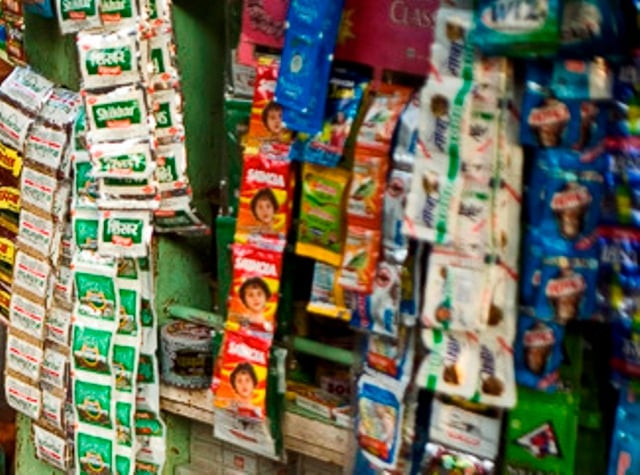India clamps down on killer chewing tobacco
Gutka is blamed for India's 75,000 to 80,000 new cases of oral cancer a year, the highest in the world.

India clamps down on killer chewing tobacco
Like millions of young Indians, the factory worker was for years hooked on "gutka" -- a cheap, mass-produced mix of tobacco, crushed areca nut and other ingredients that several states are now trying to wipe out.
"It gave me a high. It felt nice," Kanade told AFP quietly at the Tata Memorial Hospital in Mumbai, where he is due to undergo surgery. The father-of-two, whose swollen cheek hints at his disease, is aged just 35.
His brother Datta travelled with him from their village in rural Maharashtra state, where he says children start munching on colourful sachets of gutka, each priced at only one rupee (two US cents), at the age of just 11 or 12.
"I'm not sure if the government can ban it or not, but they should," Datta said.
Maharashtra, of which Mumbai is the capital, on Wednesday became the fourth state this year to outlaw gutka, which campaigning doctors say is targeted at children -- even though Indian law prohibits tobacco sales to those under 18.
They point the finger primarily at gutka for India's 75,000 to 80,000 new cases of oral cancer a year, the highest in the world, according to the US-based Campaign for Tobacco-Free Kids.
Madhya Pradesh, Kerala and Bihar states have already banned gutka this year, following the earlier example of Goa, while others including Uttar Pradesh, India's most populous state, are considering similar action.
But they face a struggle -- not only to enforce the law on the streets, but to overcome the powerful lobby of the billion-dollar gutka industry, which is disputing the bans on the grounds they are unlawful.
Leading the anti-gutka fight in Mumbai is Kanade's surgeon, Pankaj Chaturvedi, a head and neck cancer specialist.
He says half of his mouth cancer patients die within 12 months of diagnosis, while the rest are left severely disabled.
While tobacco has been chewed across the subcontinent for centuries, often in a concoction known as "paan", Chaturvedi said gutka took over in recent decades as a more convenient, ready-made version for modern life.
"It comes in a pouch, it doesn't make your tongue and mouth red and it doesn't make an urge for spitting," he said, listing substances found in gutka including lead, arsenic, copper, chromium and nickel.
The youngest addict he has treated was a 13-year-old boy, who died of an advanced form of mouth cancer.
"Gutka captured both economic strata, the poorest and the richest. They advertised very strategically to capture the entire youth," he said.
An estimated five million Indian children are hooked on tobacco, although specific chewing figures are unclear, while the Global Adult Tobacco Survey in 2010 showed that 206 million Indians aged over 15 were using smokeless forms.
The states now shifting such products off the shelves are taking their cue from a ruling by the Food Safety and Standards Authority of India in August last year, which said tobacco could not be used in food products.
Their moves are hotly contested by the Smokeless Tobacco Federation (India), an association of chewing tobacco businesses, which is launching court petitions to get them overturned.
"What they are doing is totally unconstitutional," the group's executive director Sanjay Bechan told AFP.
"Tobacco is tobacco. Food is food," he said, insisting that gutka comes under the Cigarettes and Other Tobacco Products Act of 2003 and cannot be governed by food safety regulations.
Bechan said an end to the smokeless tobacco industry, worth about $2.5 billion, threatened the livelihoods of millions.
Chewable products, he added, were being unfairly blamed for tobacco deaths largely caused by smoking. "How can you guarantee if gukta is banned people will not smoke?"
For now, complete eradication remains far from imminent.
With gutka banned in just small patches of India, officials face an uphill battle to keep the product at bay while it remains legal in most of India's 28 states.
"It's a struggle to keep the supplies under control. The borders are porous, there's no restrictions on trade," said Ashwini Kumar Rai, the Food Safety Commissioner in Madhya Pradesh, where a ban was introduced in April.
He said they had since shut down eight gutka manufacturing factories in the state and acted on public tip-offs to seize 10 million rupees ($180,000) worth of supplies, which are no longer sold prominently in shops.
"That's something that we have succeeded in completely eliminating. The trade has since gone underground," Rai said.
Health workers believe clandestine sales will at least force the price up by five to ten times and make it more difficult for youngsters to purchase.
"If children will not have access, then I see a better future," said Chaturvedi.



















COMMENTS
Comments are moderated and generally will be posted if they are on-topic and not abusive.
For more information, please see our Comments FAQ